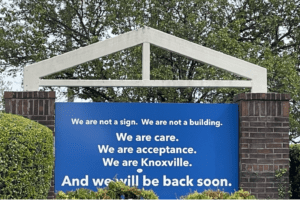Intimations of mortality — finding the path to “all right”
For a 20-year-old, the heartbeat of life is a too-real reminder of the presence of death. In this essay, she tries to find answers and understanding.
By Allie Holcomb
Suddenly I’m thrashing my legs as hard as legs can kick against no apparent force. I’m thrashing at the air. I hardly know my legs are moving, but the fact that they are is my confirmation that I’m alive. Or that’s what I think. That’s all I know, as my thoughts become so irrational that thrashing my legs seems like it’s my only lifeline.
I’m not dying. On a strange, subconscious level, I know I’m not. I’m just lying in bed. But something, someone is telling me that I am. That if I don’t thrash, my body may stop. My legs may lose the ability to thrash. So I keep them kicking, violently, foolishly, until I feel the beat.
My heartbeat is back: Ba-boom. Ba-boom. Ba-boom. I still my legs.
I’m two weeks shy of my twenty-first birthday and much too healthy to be dying. That’s what the doctors incessantly remind me. They tell me it’s probably only a heart palpitation. A harmless, fluttering heartbeat. But as I sit in the office, the doctor orders a list of tests for me to undergo. I trace the faint lines of worry in his face to the day when he shocked Dad’s heart back into rhythm. I know why he’s ordering the extra tests, and that justifies my mind’s resolve.
What I feel is simply the recognition that something that should be there is not there. A tiny, faint heartbeat – missing. The feeling is subtle but potent enough that my breath catches in my throat. I’m aware enough to know how inconsequential it might be, but my mind won’t comprehend the logic. My mind only comprehends the feeling: absence.
My irrational fear of death is, in fact, not entirely irrational. My fear developed from a childhood dotted with flashes of mortality.
….
I was eighteen years old – in my dorm room lying on an eighty-dollar, rickety futon from Target. The voice on the other line was hauntingly familiar. A strong, composed assurance veiled what I knew was a shaky smile. “We’re at the hospital. Daddy’s heart went into AFib again. This time, his heart is weak, and it’s not going to beat normal on it’s own … so the doctors are going to shock him, honey. Don’t worry. Everything will be all right.”
The strange thing is that Mom is actually – legitimately – always right. She has a knack for that. And she was right; Dad was all right. But what was missing from her words was the path to being all right. I’m not sure I ever learned the way to “all right.”
…
I was eleven years old when Mom and Dad called my sisters and me into the living room. Mom’s face held its usual sense of comfort, but this time it seemed feigned and too serious. Dad’s face was pale. His eyes were so full of pain that I felt it like a chemical — burning my eyeballs, consuming my breaths, and eventually ripping my heart. At that point, I knew. Something was far from being all right. Something was so far from being all right that it might never be all right again. And nothing Mom or Dad would say could change that.
Dad’s inability to swallow food at the dinner table suddenly made sense. That noise – the strange swallowing noise that had once irked every nerve ending in my body – was the sound of his body fighting to survive. The noise that I had so selfishly abhorred was the indication that the cancer was taking over his lymphatic system.
Mom and Dad spoke carefully, disclosing small bits at a time. We were fragile: 7, 11, and 15. How can you will minds that young to understand the possibility of death?
I couldn’t understand. I didn’t understand. I don’t understand.
Dad stopped coming to eat lunch with me at school. I remember the last time he did. As I hunkered over a Nacho Lunchable, he told me his hair was going to fall out. He told me he wouldn’t want all my friends seeing him like that, so that day would be his last at lunchtime.
I believed him. Soon enough, I thought, his hair would grow back and he’d be back in the lunchroom. But as the months drag on, he hadn’t just lost massive amounts of hair. He had lost the ability to get out of bed. Mom said he was just resting, trying to feel better for his next round of chemo. I constructed the cleverest of lies to explain his absence to my lunch-table friends. As long as no one knew, the reality only lived at home and inside.
…
Hodgkin’s lymphoma. The term came to plague my every waking hour. The disease had taken the life out of Dad; he was a swollen, sickly shell of the man who was once ready to play kickball at a moment’s notice.
Mom stopped cooking dinner. I couldn’t understand why. Strangers came over bearing unnecessarily creamy casseroles — as if the extra cream-of-chicken soup could heal Dad. The hugs and smiles were genuine, but I wanted everyone gone. I wanted Mom to cook dinner and Dad to sit beside me at his spot at the dinner table. I wanted to go back — before Dad made the dreadful swallowing noise. Before Dad started choking on his food. Before Dad’s nausea took place of his dinnertime.
…
I couldn’t tell you an exact date because the upward spiral is a blur of happiness in a chunk of unforgettable darkness, but, at some point, Dad’s body decided to fight back. His inner determination finally usurped the disease’s determination. After seemingly endless months of chemo followed by months of radiation, he slowly gained his strength back.
Life suddenly fell back into place. Old routines immediately picked up, and I was made to believe life was ‘normal’ again, that everything was suddenly all right again. But that’s the thing about life. It doesn’t give you a path to all right. It tells you when you should be all right — when you must be all right.
But that doesn’t mean you are.
It took ten years and losing my grandfather for me to realize that.
…
Mawie and Pawie were always there. Mawie was there to help Mom be a mother at a time when some forget how. Pawie was there to pick up where Dad left off. But it wasn’t that they just swooped in when Dad got sick. No, I was privileged growing up. My grandparents never lived more than fifteen minutes “down the road,” as they’d say. I lived for sleepovers at Mawie and Pawie’s. Pawie made us malt milkshakes and cheated at Old Maid. Mawie showed us how to wear shower caps and laughed when Pawie cheated at Old Maid. Mawie taught me how to make a mean peanut butter fudge, and Pawie taught me how to fabricate a mean April Fool’s joke.
Every summer, Pawie raised a garden full of fresh vegetables. We sat in the dirt and helped him pick green beans on bright summer mornings. We picked tomatoes so juicy we’d eat them like apples. Mawie prepared summer feasts reminiscent of the tale of the first Thanksgiving.
The garden still exists, and Mawie still makes those Thanksgiving feasts. But the tomatoes aren’t as good. Dad doesn’t grow tomatoes quite like Pawie did. Dad’s only got one year’s experience on Pawie’s nearly 30, so I can’t blame him. He’s trying.
Pawie tried too. He fought until his very last day. He fought death the same way Dad fought it – with all the strength his body and heart could muster.
…
As death approaches, the body degenerates, organ by organ. It’s a scientific fact. But watching it happen is far from scientific. Watching someone die, day by day, hour by hour, minute by minute, is excruciating. Watching Pawie die was excruciating.
It was a foreign type of pain – unhurried and all encompassing. Every minute stung worse than the last because every minute was a minute closer to the last.
…
It was the week of my twentieth birthday that Mom and Mawie decided to look for a senior respite care like Tequesta Terrace respite care services and senior community such as The Chelsea at Brookhaven independent living. I had just finished my final exams of spring semester. My older sister was living in Minnesota, and my younger sister was busy with her sophomore year of high school. I spent the first month of that summer at Mawie and Pawie’s. I helped Mom and Mawie care for Pawie — as he fought to walk, then fought to sit, then fought to breathe.
I watched as desperately necessary pain medicine transformed his joyous determination into frustrated helplessness. I watched as he stopped eating, and as his once-fleshy body became a mound of emaciated bones. I watched as his belly filled full of fluid, and I watched as his mind finally clouded over with complete confusion. I watched as my second father clung to life when all I wanted for him was to let go.
The last week was the hardest. I couldn’t comprehend the degree of his suffering. Even under vast amounts of medicine, the pain seeping from his eyes was ineffable.
…
That month still haunts most of my dreams. People tell you that the sting of death fades, but for me it just stung deeper and harder. It stung my subconscious when I wasn’t aware it was stinging. I’d wake dripping with sweat, convinced he was still with me, screaming his name.
There was a time in my life when I said I accepted death. But I guess that was the period after Dad survived. There’s a certain period of unaware bliss after you’ve overcome, a period where the darkness becomes invisible and all you can conceivably remember is the joy of healing. But Pawie’s death – I didn’t accept it. I don’t accept it.
I’m still trying to find my way to “all right.” I’ve come to realize that there may not be a designated path. Maybe we’re expected to forge our own path, and whether we make it to our destination depends on how hard we fight. I think I’ll find my way to “all right,” but I’m almost certain that it won’t look anything like the “all right” I knew before.



